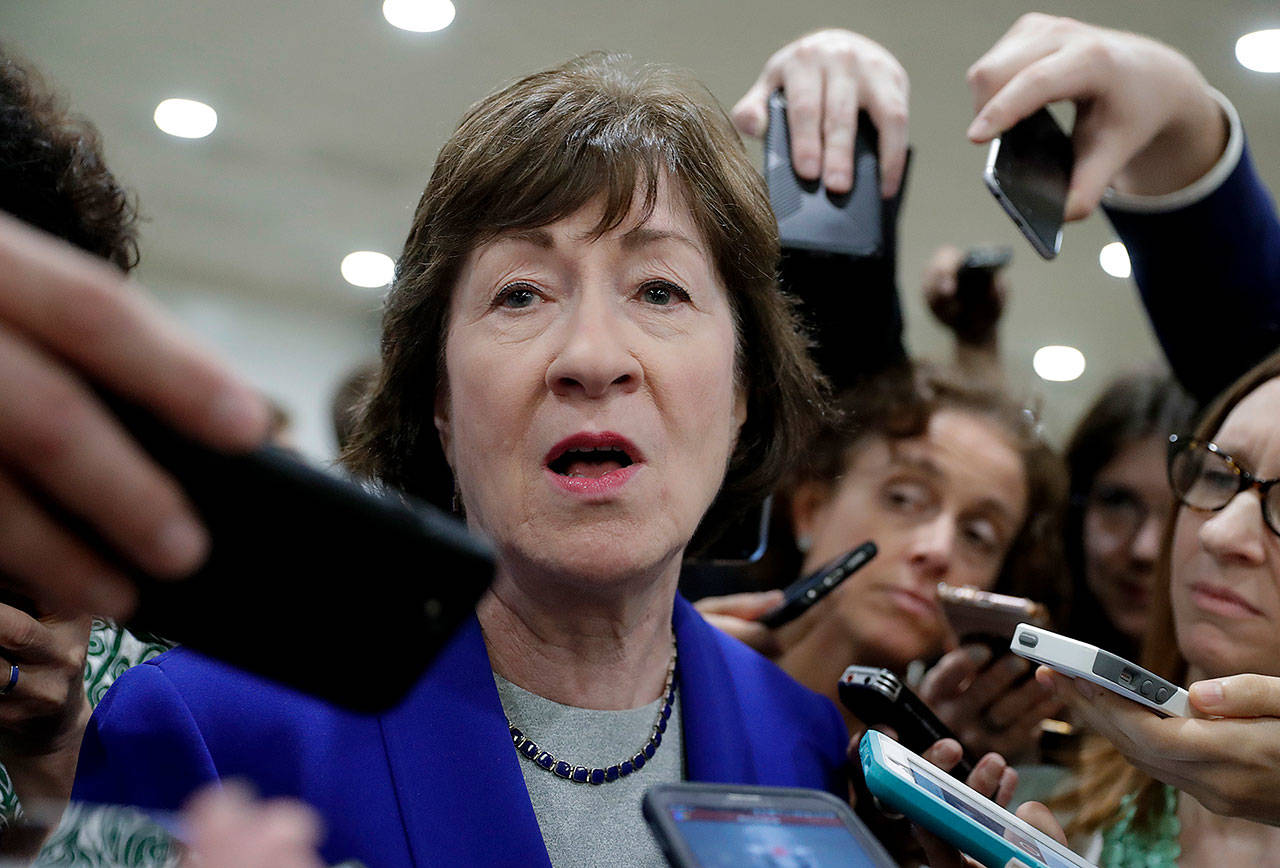By Ricardo Alonso-Zaldivar / Associated Press
WASHINGTON — The Senate Republican health care bill would guarantee immediate assistance for insurance markets that are struggling in many states. Yet overall it would do the same thing as its House counterpart: less federal money for health insurance and a greater likelihood that more Americans will be uninsured.
The bill’s impact on personal health care costs would be uneven: Premiums would likely go down for younger people, but older people would pay more. Out-of-pocket costs to cover insurance deductibles and co-payments would go up.
For those who believe the government is too involved in health care, the Senate bill stands as an overdue course correction. But those who believe health care is a right will see it as a step back.
How the Senate bill compares to the House bill and to the Affordable Care Act that Democrat Barack Obama signed into law seven years ago:
Medicaid
Obama law: States have the option to expand Medicaid to cover more low-income adults. Feds pick up a generous share of the cost, no less than 90 percent. Medicaid covers some 70 million people, from newborns to elderly nursing home residents.
House GOP bill: Reduces the generous federal match for expanded Medicaid to the same rate states get for other beneficiaries, starting in 2020. (The basic Medicaid match rate now averages 57 percent nationally.)
More significantly, ends Medicaid’s longtime status as an open-ended entitlement, with Washington paying a share of what each state spends. Places a per-person limit on future federal contributions, starting in 2020.
Senate GOP bill: Stretches phase-out of Medicaid expansion financing. Higher payments would be provided through 2023. Exempts spending on special-needs children from cap on federal Medicaid matching contribution. Uses a less generous inflation adjustment than House bill.
Pre-existing conditions
Obama law: People cannot be denied coverage because of pre-existing medical problems, nor can they be charged more because of poor health.
House GOP bill: To be protected, consumers must avoid a break in coverage of more than 63 days. Those who let their coverage lapse pay a 30 percent premium penalty for a year. States can seek waivers that would allow insurers to charge higher premiums based on health status under certain circumstances.
Senate GOP bill: There is no penalty for having a break in coverage and no waiting period for consumers to use their insurance. States cannot seek waivers that would allow insurers to charge more based on health.
Subsidies for private insurance
Obama law: Provides two kinds of subsidies for people who don’t have access to coverage on the job. Income-based subsidies help with premiums and with out-of-pocket costs such as deductibles and copayments. Premium subsidies keyed to the cost of a midlevel “silver” plan.
House GOP bill: Premium subsidies are keyed to age, not income. Ends cost-sharing subsidies in 2020, while failing to clear up uncertainty about whether they can be paid currently.
Senate GOP bill: Premium subsidies are keyed to income, age and geography, and are more tightly focused on lower-income people. But the benchmark for subsidies would be a bare-bones “bronze” plan. Cost-sharing subsidies are explicitly extended through 2019, an important detail that should help calm insurance markets.
Age factor
Obama law: Insurers cannot charge their oldest customers more than 3 times what they charge young adults.
House GOP bill: Loosens the age restriction so insurers can charge older adults up to 5 times more.
Senate GOP bill: Generally follows House standard.
Mandates to carry health insurance
Obama law: Requires those deemed able to afford coverage to have a policy or risk fines from the IRS. Requires larger employers to offer coverage to full-time workers.
House GOP bill: Repeals coverage mandates immediately.
Senate GOP bill: Same as House.
Standard health benefits
Obama law: Requires all insurance plans to cover services from 10 broad “essential services,” including hospitalization, office visits, prescriptions, maternity and childbirth, substance abuse treatment, rehabilitation, and preventive services, including birth control at no additional charge for women.
House GOP bill: Allows states to seek waivers from the benefits requirement.
Senate GOP bill: Also provides a pathway for states to seek benefit waivers.
Opioid epidemic
Obama law: Medicaid expansion has enabled many states to provide comprehensive treatment to people caught in the opioid epidemic.
House GOP bill: No additional money for the opioid epidemic.
Senate GOP bill: Creates $2 billion fund to provide grants to states for substance abuse and mental health treatment. Ohio Republican Sen. Rob Portman had sought $45 billion over 10 years.
Taxes
Obama law: Raised taxes on upper-income people and health care companies to finance coverage expansion.
House GOP bill: Cuts taxes by nearly $1 trillion over the next decade, mostly for corporations and the richest families.
Senate GOP bill: Tax cuts very similar to House bill, though some would be delayed.
Abortion
Obama law: Private health insurance plans sold to people who receive federal subsidies can cover abortion. However, they must collect a separate premium, strictly segregated from taxpayer funds.
House GOP bill: Forbids abortion coverage by private plans sold to people who receive taxpayer subsidies. Defunds Planned Parenthood.
Senate GOP bill: Forbids abortion coverage by plans sold to people who receive taxpayer subsidies. Defunds Planned Parenthood.
However, under Senate rules, there’s a chance abortion restrictions on private insurance plans may be struck down. In that case, Senate leaders plan a workaround. Billions of dollars to stabilize state health insurance markets would be funneled through the Children’s Health Insurance Program, which already has strong limitations on abortion funding. The idea is that insurers needing access to the stability fund would essentially have to drop coverage for abortions.
Talk to us
> Give us your news tips.
> Send us a letter to the editor.
> More Herald contact information.

























